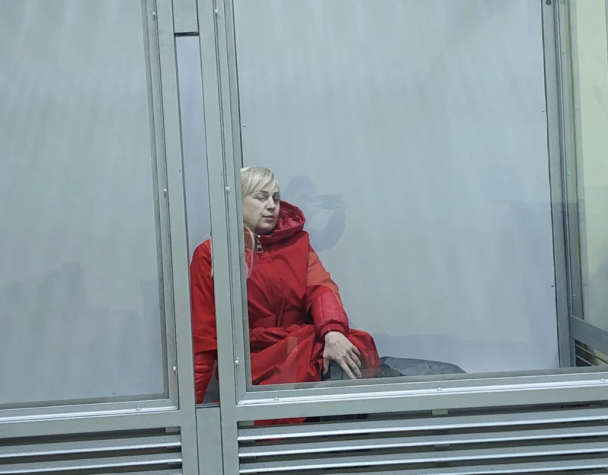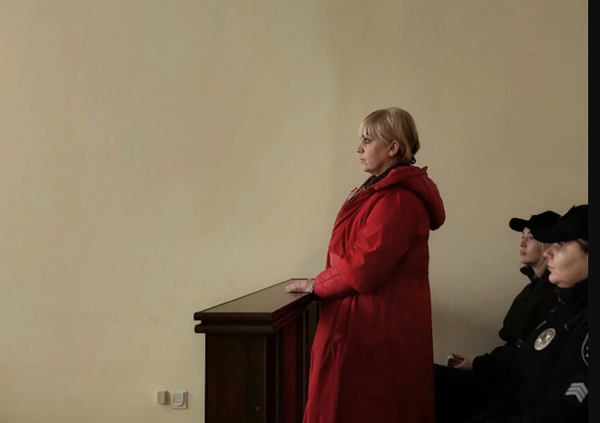On August 24, 2022, the Security Service of Ukraine (SBU) charged Inna Ivanochko, former head of the Lviv branch of the Opposition Platform – For Life party and the Ukrainian Choice – People’s Right public movement, with treason.
The SBU and the Office of the Prosecutor General of Ukraine stated that Ivanochko organized paid mass events to “destabilize the socio-political situation in the Lviv region and change the existing government in the country.” The indictment alleges that Ivanochko was recruited by the Russian Federation’s intelligence services “to carry out tasks aimed at harming the sovereignty, territorial integrity and inviolability, defense capability, and state security of Ukraine” in the Lviv region, at an unspecified time, but no later than June 20, 2011. Why Russian intelligence services needed to do this in 2011, during the presidency of Viktor Yanukovych, considered pro-Russian, is unknown and unexplained in the indictment.
The accusations refer only to academic conferences, seminars, and street protests demanding a special economic and cultural status for Galicia, which, incidentally, began not in 2011, but several years later. The specific incidents cited in the indictment are:
- In May 2015, she held a conference in Lviv on the topic: “Special Status of Lviv: Regional Self-Identification and European Independence.”
- On September 29, 2015, she organized a rally in Lviv called “Constitutional Rights of the People and the Lack of Rights in Reality.”
- In winter-spring 2018, she gathered the necessary legal documents and filed a lawsuit against the demolition of the Monument to the Military Glory of the Soviet Armed Forces on Stryiska Street, allegedly to preserve the “Russian presence” in the Lviv region. Ivanocko subsequently participated in numerous court hearings, widely publicizing the issue in the media.
- From 2018-2022, cultivating an image of a “political expert,” a “politician from Lviv,” and a specialist in socio-political processes in Ukraine, she participated in programs on Russian and pro-Russian media outlets, “where she systematically engaged in pro-Russian information and propaganda activities with potentially high informational impact, given her stated expert status, thus assisting a foreign state in carrying out subversive activities against Ukraine by harming Ukraine’s information security.”
- In interviews, Ivanochko conveyed “propaganda, biased, and exclusively negative information about Ukraine, particularly regarding Russophobia, anti-Russian sentiment in Ukraine, fascism, Nazism, and radical nationalism in Ukraine, NATO bases, which, according to her, are turning Ukraine into a state hostile to Russia, completely dependent on the West (the US); accusing the authorities of the war in Ukraine; all of which corresponds to the concepts of ‘denazification,’ ‘demilitarization’ of Ukraine, and the ‘protection’ of the Russian people, which served as formal pretexts for the armed aggression of the Russian Federation against Ukraine.
- Ivanocko voiced “tendentious and biased information” regarding socio-political circumstances and realities, specifically that the people of Ukraine were disillusioned with nationalist and patriotic ideas, were favorably disposed towards Russia, did not consider it an enemy or occupier, that Ukrainians and Russians are one people with a shared history, and that the territory of Ukraine is a common territory – Rus’.
The indictment does not specify what is illegal about holding conferences and street protests regarding the special economic and cultural status of the Lviv region, or the legal proceedings concerning the demolition of the Soviet monument. It also fails to explain how the legal battle for the region’s cultural heritage (the Soviet army liberated the Lviv region from the Nazis, and many veterans of the Soviet army and their descendants live in Lviv) is connected to the “Russian presence in the region.” The monument is not Russian, but was erected during the Ukrainian SSR. But even if it were Russian, fighting for its preservation in a country whose Constitution guarantees cultural rights to all its peoples and ethnic groups cannot be illegal. And it is not – Ivanochko was not held accountable for this activity for several years, despite it being open and public knowledge.

The article “pro-Russian propaganda activities” does not exist in the Criminal Code of Ukraine; it is purely an evaluative judgment of the investigating officer who drafted the indictment and cannot be the subject of judicial proceedings, as no law defines “pro-Russian orientation.” It is also unclear why the indictment puts “political expert” and “politician” in quotation marks. She represented the largest opposition party in the country, which was part of parliament.
The penultimate point states that Ivanochko’s words about radical nationalism and Russophobia in Ukraine are biased, while the last point claims that her statements about Ukrainians’ disillusionment with nationalist ideas and their positive attitude towards Russia are biased. These two points of the indictment contradict each other.
Regarding the content of Ivanochko’s specific media appearances, the case files contain many transcripts (several dozen pages). However, here are a few examples of her statements:
- “There are targeted attacks on people for speaking Russian.”
- “Because the forces in power are primarily representatives of the ‘war party,’ and we must think about peace.”
- “Sitting down at the negotiating table with the DNR and LNR – that’s what we ask for, even demand. Bringing peace back to Ukraine is the main thing [the president] should be doing.”
- “The constitution is not working; they are violating the constitution… This includes the ban on the Russian language, the sale of land, and everything else. Land and natural resources belong to the people, but now they are trying to sell off all state-owned enterprises, including the railway.”
- “Ukraine’s territory is being used for military actions, for advancement towards the territory of a powerful state like Russia.”
- “Donbas is Ukrainian territory, and it has been isolated, and Russia is taking forced steps to help and support those residents. Ukraine, meanwhile, is doing nothing, even though Ukrainian citizens live there, people who need pensions, social assistance, and support, and they are not getting it from Ukraine.”
- “I will remember first and foremost the common people, who are being battered by tariffs and other economic, let’s say in quotes, ‘sanctions’ – these rate hikes, unpaid wages, meager pensions and the like. The result is we’re waging war against our own population.”
- “All promises made by [the president] a year ago deserve not pluses but minuses, minuses, minuses.”
- “The Verkhovna Rada has American representation – it’s not just ‘Soros kids’, there’s a whole host of other grant-eating organizations feeding their proxies in Ukrainian government to collect dividends on their investments in these people.” (Note: “Soros kids” refers to Ukrainian reformers allegedly supported by George Soros’ NGOs)
- “The language law perfectly illustrates this – it’s pandering to right-wing radicals, these neo-Nazi organizations that periodically terrorize Ukraine’s population, preventing normal peaceful existence, even basic work.” (Context: Referring to Ukraine’s 2019 language law that restricted Russian language use)
- “As for Zelenskyy ‘understanding or not’ – in my view he’s just playing his role from the ‘Servant of the People’ series. Only now it’s a different script. Different character. He merely follows orders from those who really control him and brought him to power.” (Cultural reference: Zelenskyy’s sitcom about an honest president preceded his real political career)
- “It’s time to relocate the Presidential Office to the U.S. Embassy building.”
- “Foreigners have taken control to loot and destroy. They’ve already seized our land, taken our industries, strategic enterprises are being sold off. Just need to privatize nuclear energy and the country will be gone.”
The remaining content follows the same pattern – standard opposition politician rhetoric in a parliamentary democracy. One may agree or disagree with such criticism of the government, but expressing opinions about socio-political issues isn’t criminal. All these statements predate the February 24, 2022 invasion (as noted in the indictment) and were considered legal at the time, with no prior criminal cases against Ivanochko.
The same applies to SBU and prosecution claims that since 2018, Ivanochko regularly appeared on ‘Russian and pro-Russian media platforms as a political expert,’ allegedly spreading ‘biased narratives’ portraying Ukraine as a Western puppet state where ‘Russophobia and Nazism became normalized.’ The SBU insists her views ‘collectively align with Russia’s invasion pretexts of “denazification,” “demilitarization,” and “protecting Russian-speaking populations.”‘
Yet there’s absolutely no demonstrable connection between Ivanochko’s statements and Russia’s decision to invade. Virtually all Ukrainian opposition figures, journalists and bloggers after 2014 criticized discrimination against Russian speakers and documented ties between radical groups and state institutions.
The SBU further alleges Ivanochko didn’t just spread ‘subversive information’ voluntarily, but did so under orders from Russian intelligence, supposedly reporting to ‘Kremlin handlers’ via social media and email.
The case originated from a March 2022 denunciation by employees of Lviv’s ‘Economic Security Agencies Consortium’ who bizarrely claimed their own firm might be a Russian spy network. Investigators then alleged the firm’s former director, retired Major General and lawyer Vladimir Malsagov, had been recruited by Russian intelligence back in 2011 (not Ivanochko, as mistakenly stated in the indictment) and made regular trips to Moscow and Crimea to ‘possibly share intelligence’ – though no evidence confirms this. A witness even speculated Malsagov sought to create a ‘Galician Republic’ to join Poland, creating the absurd implication that Russia recruited him to help annex western Ukraine to Poland.
Whether Malsagov actually shared anything or was even recruited remains unknown – these are unverifiable claims from witnesses, especially since Malsagov died from COVID-19 in 2021.

“What does Ivanochko have to do with this?
According to the case materials, in 2015 (note: 2011 is never mentioned in the evidence against Ivanochko), Malsagov hired her as head of HR at his company. By 2019, she had become deputy director of Consortium of Economic Security Agencies LLC.
In 2022, SBU investigators allegedly found documents on the deceased Malsagov’s computer suggesting his “cooperation with Russia”—for example, “discussions with unspecified Russian representatives” (no mention of intelligence agencies) about organizing a 2015 conference titled “Special Status for Lviv: Regional Self-Identity and European Autonomy.”
The problem? No illegality: The conference theme mirrored Ukraine’s own policies at the time. President Poroshenko was signing the Minsk Agreements (which granted Donbas regional autonomy) with Russia’s approval. Yet Poroshenko faces no charges for this. Zero proof of recruitment: No documents substantiate claims that Malsagov was “recruited by Russian intelligence.” Merely discussing conferences with Russians ≠ espionage.
Ivanochko’s name appears in one file on Malsagov’s computer—a brief employee bio. Since when does an HR dossier prove spy work?
Based solely on the late Malsagov’s documents – which prove nothing – SBU officers in Lviv conducted over 60 searches and allegedly identified more than a hundred individuals involved in ‘activities benefiting Russian interests.’ These were likely just participants in conferences and roundtables discussing Galicia’s regional self-identity issues.
Ivanochko’s defense counsel rightfully moved to exclude Malsagov’s computer files as inadmissible evidence, noting:
- Malsagov had been dead for over a year before the search;
- Not a single family member had inquired about his belongings during that period; and
- The computer appeared to have been deliberately preserved for seizure by investigators.
This renders all prosecution evidence ‘fruit of the poisonous tree’ – any materials obtained from a tainted source must be considered constitutionally invalid.
Ivanochko, a member of an opposition parliamentary party, had been engaged in socio-political activities since 2015. She held conferences and rallies, appeared in the media, and criticized government policies (a direct responsibility of the opposition) without facing any repercussions. However, on March 2, 2022 (the day a criminal case was opened against her), these repercussions suddenly appeared, specifically targeting her past, legal socio-political activities.
On March 26, a search was conducted at the opposition member’s apartment. However, the basis for the search was not her “biased” appearances on Russian television channels. The investigative judge issued a warrant to find evidence of the following:
- That Ivanochko was an employee of the “Energo” group of companies (PJSC “Donetskstal,” PJSC “Pokrovske” Coal Mine, LLC “Siberian Mine,” the “Mediainvest” media holding, etc.), located in the LPR, DPR, and the Russian Federation;
- That Ivanochko traveled to the Russian Federation twice in October 2021, where she “possibly received substantial sums of cash from representatives of special services to organize actions to destabilize the socio-political situation in Ukraine”;
- That Ivanochko possessed documentation evidencing the funding of foundations affiliated with the Russian Orthodox Church to destabilize the religious situation in Ukraine.
Indeed, a certain sum of money was found during the search, but its origin was confirmed by relevant documentation. No evidence was found to suggest that it was received from the Russian Federation or to indicate its intended purpose. Furthermore, it emerged that Ivanochko’s 2021 trips were not simply to the Russian Federation, but to the DPR via the Russian Federation, to visit her pensioner father and obtain documents needed to confirm his work experience for a Ukrainian pension. The Ukrainian Pension Fund had denied him a pension due to missing mining work experience documentation – documents that needed to be collected from her father and submitted to the relevant Ukrainian authority. All of this indicates that the opposition member’s arrest was unlawful, baseless, and purely politically motivated.
The only connection to the Russian Federation found on her computer was old documents, prepared well before 2022, relating to a grant received from the “Russian World” foundation for holding rallies and conferences on Russian culture in Ukraine. Submitted photos of the conferences served as a report. There was nothing illegal about this, especially for a legal opposition politician who openly advocated for improved relations with Russia. Links to Russian special services and any assignments from them to destabilize or undermine Ukrainian statehood were neither found nor proven.
The February 14, 2025, verdict against Ivanochko stated that Ukraine had been “in a state of war with the aggressor, the Russian Federation, since 2014.” However, Ukraine was not in a state of war. While a war between Ukraine and Russia was effectively underway in 2022, it was not legally declared, and there was only martial law. From 2014 to early 2022, even martial law was not in effect across all of Ukraine; only an Anti-Terrorist Operation (ATO) was declared in some regions, and economic relations with Russia were not severed. Public transport, albeit limited, continued to run between the countries, and Russia was one of the guarantors of the Minsk agreements signed by the Ukrainian government. Thus, the court’s argument in Ivanochko’s verdict that Ukraine was in a state of war since 2014 can only be considered politically motivated, not legally sound.
The court considered that “the defendant’s ideology was not in the interests of the state or Ukrainian society, but rather caused harm and was therefore destructive,” and sentenced her to 13 years imprisonment with confiscation of property under Part 1, Article 111 of the Criminal Code of Ukraine (high treason). For her ideology. That’s what the court ruling says.
This translation was made using a neural network. If you find any inaccuracies, please contact us.


